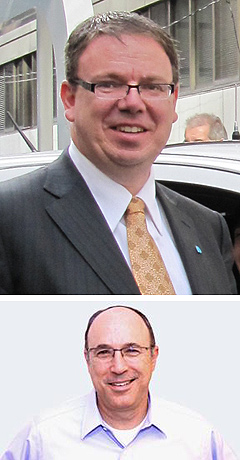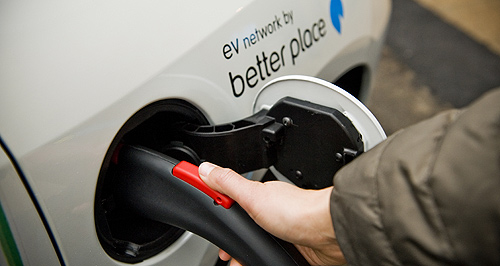Make / Model Search
News - General News - Electric VehiclesAussie future for Better Place in doubtBetter or worse: Slow EV uptake, no battery swap-compatible cars and a global shift in focus away from Australia do not bode well for Better Place here. Focus on Israel, Denmark sidelines Better Place in Australia as CEO Thornley departs29 Jan 2013 THE Australian future of electric-vehicle charging infrastructure provider Better Place is in doubt as the global company shifts focus onto its best-established, core markets of Denmark and Israel to battle accumulated global losses approaching $US600 million ($A576m). This change of tack follows the recent departure of the company’s global CEO Evan Thornley – an Australian former politician, entrepreneur and chief executive of Better Place’s local arm – after less than four months in the role. According to insiders, expansion of Better Place Australia’s public charging network is on hold until the new global leadership team makes clear indications of what the local impact of its change in focus will be – but the options on the table are clear: to keep pushing forward or pull back. Almost a quarter of Better Place Australia staff are understood to have already been laid off as part of a worldwide rescue plan formulated by Mr Thornley. The RACV, Lend Lease Ventures, energy group ActewAGL and several private investors have pumped a combined $27 million into Better Place Australia.  From top: Former Better Place CEO Evan Thornley Better Place chief financial officer Alan Gelman. From top: Former Better Place CEO Evan Thornley Better Place chief financial officer Alan Gelman.It is unclear whether Better Place Australia’s woes were influenced by or had an influence on Renault’s decision late last year to indefinitely postpone the Australian introduction of its electric Fluence ZE sedan, the world’s only production car compatible with Better Place’s battery swap technology. Only a handful of prototypes around the world, such as the seven electric-powered Holden Commodores built by Port Melbourne start-up company EV Engineering – of which Better Place is a major partner – and a fleet of Nissan Dualis taxis built for a Better Place trial in Tokyo have battery swap capability. Renault appears to have dropped the battery swap technology central to Better Place’s business plan as the Kangoo ZE, Zoe and Twizy EVs all have fixed batteries – and there is little sign of the technology being adopted by other manufacturers. Nevertheless, Better Place reportedly remains committed globally to battery swapping as it regards the technology as the most convenient way of extending the range of electric vehicles. In an open letter to Better Place employees, excerpts of which were published in The Financial Times, Mr Thornley said he stepped down because “strong and honestly held differences have emerged at the most senior levels of the company about how we best take the company forward”. Mr Thornley’s promotion to global CEO arose from a leadership shake-up in October that ousted Better Place founder Shai Agassi from the top job as investors lost patience with the mounting losses. In a recent interview with Reuters, Better Place chief financial officer Alan Gelman, who was promoted to deputy CEO and chairman of the Danish operation following Mr Thornley’s departure, admitted the company was at times “too focused on turning into a global company and expanded too fast”. He added that “most time and effort will be on operations in Israel and Denmark”, painting a bleak picture for the future of Better Place’s Australian operation. GoAuto understands this sentiment has had an impact on an already fragile morale at the offices of Better Place Australia, based in the inner Melbourne suburb of Richmond, as this country was to be the company’s third major roll-out market. Better Place global communications director Susanne Tolstrup told GoAuto the company strategy has not changed and that global expansion remains the plan. “The recent shift is to focus on the markets with networks deployed and cars on the road, which are currently Denmark and Israel,” she said. “This requires focused resource allocation and management attention, which will result in slowing down pace in other markets for a while. “Australia is an important front and an attractive market, which we plan to cultivate as soon as we are ready.” Better Place’s reliance on the popularity of EVs in Australia has been hampered by slow uptake, with no government incentives to help offset the high cost of purchase, a lack of widespread charging infrastructure to quell range anxiety, and the increasing efficiency of internal combustion engines. Just 413 plug-in electric vehicles – comprising the Holden Volt, Nissan Leaf and Mitsubishi i-MiEV – have been registered in Australia since the i-MiEV was introduced in 2010, with 86 per cent going to fleet buyers. Better Place Australia spokesperson Felicity Glennie-Holmes told GoAuto it is “business as usual” for the local operation, with ongoing installations of customer charging points. “No decisions have been made for operations outside Israel and Denmark,” she said. “We are continuing to support our dealers in the Holden Volt network, our drivers of i-MiEVs, Leafs and Volts across Australia, and we are continuing to fulfil all of our partner obligations.” GoAuto sought comment from Mr Thornley but had received no response at the time of publication.  Read more13th of December 2012  Renault puts indefinite halt on Fluence ZE in AustraliaBetter Place battery-swap stations up to 12 months off, Renault postpones Fluence ZE3rd of October 2012  Australian takes top job at Better PlaceFounder out and Thornley in as Better Place brings in Aussie to run the show22nd of August 2012  Only one Renault EV designed for battery swapBattery exchange system dream wains as Renault favours fixed systems in future EVs |
Click to shareGeneral News articlesResearch General News Motor industry news |











Facebook Twitter Instagram